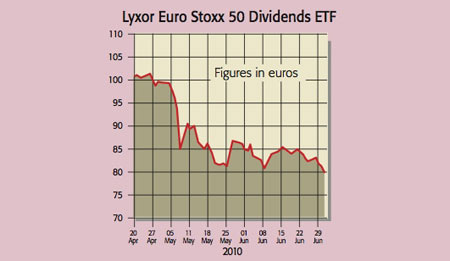
A recent exchange-traded fund (ETF) launch offers investors a novel way to invest in company dividends via the derivatives market. Despite its title, the Lyxor Euro Stoxx 50 Dividends ETF (LSE: DIV – available in both sterling and euro versions) is completely different from a conventional equity income ETF.
Income-based ETFs, such as the iShares Euro Stoxx Select Dividend 30 and FTSE UK Dividend Plus funds, track indices that are biased towards higher-yielding shares. While this makes for a fund with an attractive headline percentage rate of dividend income, it means that you automatically invest in firms that are less highly rated by the market and paying more in yield as a result. Investing this way caused huge losses in 2008, when a number of higher-paying companies cut their dividends (the banks, for example) and suffered share-price collapses.
By contrast, Lyxor’s new fund allows you to take a view on the likely payouts from the Euro Stoxx 50, Europe’s most widely tracked large-company share index. It does so by tracking a benchmark that assumes an equally weighted investment in the next five years’ worth of Euro Stoxx 50 dividend futures, as traded on the Eurex exchange. Each dividend futures contract reflects the expected total payout from the index’s component companies over the calendar year in question.
And here’s the opportunity: the futures market currently prices in a significant decline in the Euro Stoxx 50 index’s total dividends over the next few years (in fact, an 11% decline from 2010 levels by next year, and a 25% decline by 2013). If Europe’s economy sinks back into recession, dividend cuts are, indeed, likely.
But the point here is that much of the future cuts in company payouts may already be discounted. Patrick Armstrong of Armstrong Investment Management, an investor in Lyxor’s new fund, says that a pretty dramatic change in dividend policy from the Euro Stoxx 50’s constituents is indeed priced in.
Even assuming that the index’s financial stocks cut payouts completely over the next three years, and industrial and cyclical names cut dividends in half, that still leaves the dividend futures index looking slightly underpriced, he maintains.
And with Lyxor’s fund having declined by 20% since its April launch, dragged down by share-market weakness and pessimism about prospects for company payouts, now looks a reasonable time to buy in.
• Paul Amery edits www.indexuniverse.eu.